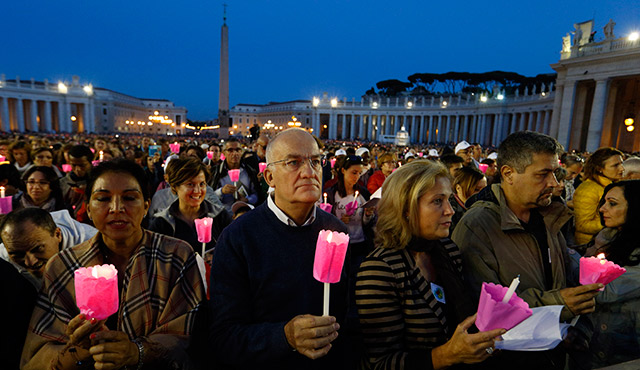Christian living is inseparable from prayer, as we seek to draw closer to God and discover what he wants us to do with our lives. St. Paul has called us to “pray without ceasing.”
The United States Catechism for Adults says, “Genuine Christian prayer is attention to the presence of God and seeks ways to be of greater service to God and others.”
The Catholic Church has a treasure trove of prayers to guide us in our communication with God that are drawn from the Old and New Testaments, such as the psalms and the Lord’s Prayer. Other prayers have evolved from pious traditions, like the rosary that honors the Blessed Mother’s role in bringing Jesus into the world and meditates on the mysteries in the life of Jesus, and novenas, which are nine days of prayers often leading up to holy days and saints’ feast days.
Prayers are of five major types: for blessing or adoration, petition, intercession, thanksgiving and praise.
Not all prayers are formulated or even have words. Meditation consists of listening to what God has to say when you marvel at the beauty of the natural world or read Scripture or admire art and music or think about everyday conversations that have inspired you. In contemplative prayer you need only to sit silently and wait for the Holy Spirit to speak. Adoration of the Blessed Sacrament, spending quiet time with Jesus, is a form of prayer growing in popularity.
But there are also very carefully constructed liturgical prayers, starting with the Mass, the central public prayer of the Church, where we encounter the Trinity that imparts the gift of salvation, and the Liturgy of the Hours, consisting of psalms and other prayers recited to sanctify each day. Priests and deacons are required to pray daily the Liturgy of Hours, and the Church encourages the laity to join in.
Scripted prayers have proliferated over the centuries asking God to resolve the gamut of human problems. There are specific petitions for help with choosing vocations, reducing global poverty, supporting life, caring for creation, and fostering world peace, as well as for blessing our meals, and keeping our souls safe through the night. Other prayers to the saints and the Blessed Mother ask them pray to God on our behalf.
Special prayers, even books of them, are available to prepare for various celebrations on the Church calendar, such as Christmas and Easter.
Not everyone wants to read or memorize prayers. “Speaking from the heart also has its place and some would go to that first,” says Lesa Truxaw, the Director of the Office for Worship for the Diocese of Orange. “Nothing is wrong with that. It deepens the relationship with God, which is the purpose of prayer.”
But format prayer also has value. “Sometimes you are in a period where you don’t have words of your own. You might be in deep grief or in the middle of trying circumstances… Falling back on memorized prayers helps,” says Truxaw. Another advantage, she says, is that people can pray together if they recite a prayer they know in common.
Biblical accounts describe Jesus as always prayerful. He recited the ancient prayers well known to his Jewish community in the synagogues and temple and also frequently retreated to a secluded place to pray alone.
When the disciples asked Jesus how to pray, he taught them what we know as the Lord’s Prayer. Saint Thomas Aquinas praised the Lord’s Prayer as the most perfect of all prayers and the Catechism calls it “the quintessential prayer of the Church.” The prayer is part of the Liturgy of Hours and the sacraments of Christian initiation: baptism, confirmation and Eucharist.
Along with the Lord’s Prayer, the Hail Mary is among the most widely used prayers. The first half comes from Luke’s Gospel account of the angel Gabriel’s announcement to Mary that she would be the mother of God, and the second half is a request for Mary to pray for us. The rosary, which was developed by the medieval Church, repeats the Hail Mary, along with the Lord’s Prayer and doxology praising the Trinity, in decades of prayers.
And each time a Catholic goes to confession, he or she prays the Act of Contrition.
Prayer doesn’t have to be complicated. The Orthodox tradition embraces the “Jesus Prayer” a one sentence invocation: “Lord Jesus Christ, Son of God, have mercy on me, a sinner,” echoing the cry of the publican in the New Testament whose humility Jesus commended.
The Catechism says just calling upon the name of Jesus is “the simplest way of praying always.”
Those wanting to start a prayer life can receive direction from a trained spiritual director or a parish program on prayer or simply talk to someone at a church who knows how to pray. But you don’t have to copy anyone.
Says Sister Barbra Ostheimer, S.N.D., an associate director of the Loyola Institute for Spirituality in Orange: “Your prayer is always unique. Everyone’s prayer is special.”

